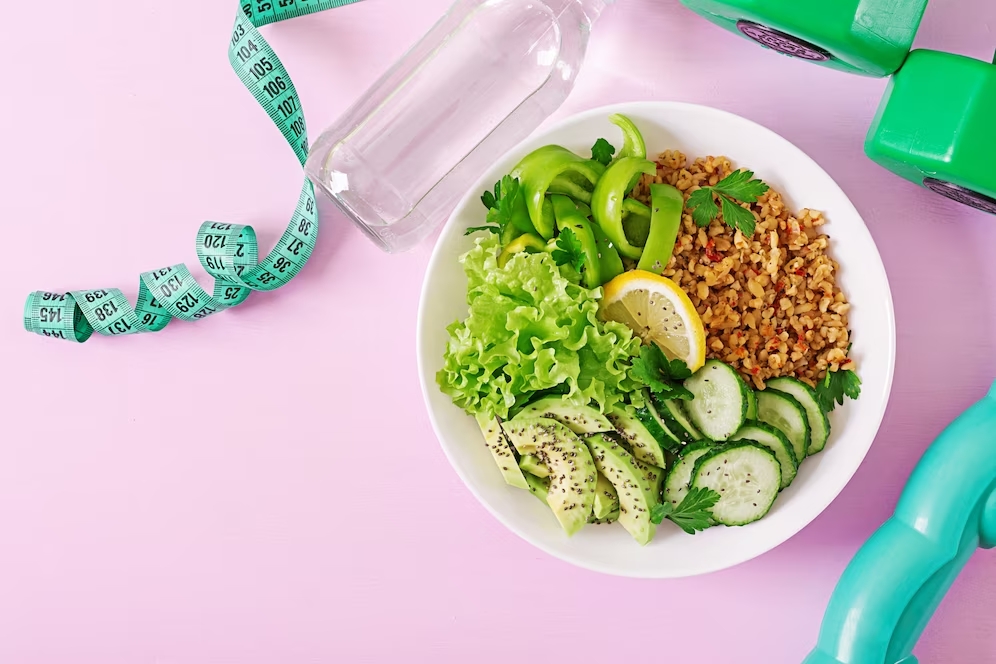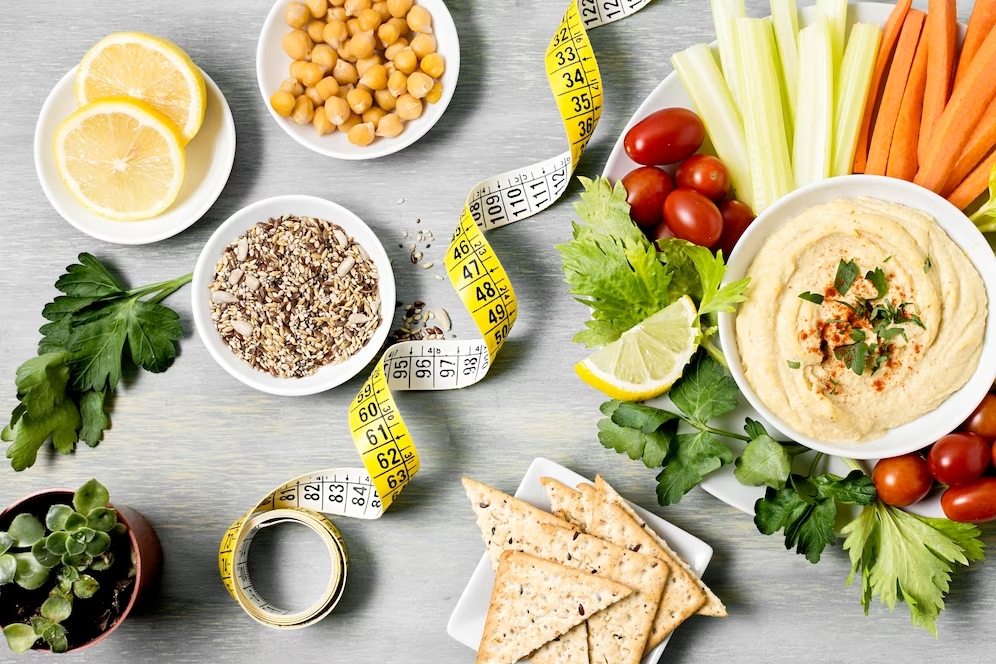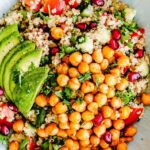Best Foods for Weight Loss
Best Foods for Weight Loss – Are you looking for the best foods to help you lose weight? With so many diets and weight loss programs, it can be overwhelming to figure out what to eat. But the good news is that plenty of healthy, delicious foods can help you reach your weight loss goals.
First and foremost, it’s essential to focus on whole, nutrient-dense foods that provide your body with the fuel it needs to function at its best. Foods that are high in fiber and protein can be beneficial, as they keep you feeling full and satisfied for extended periods.
By incorporating good foods into your diet and making healthy choices overall, you can see actual results and achieve your weight loss goals.
How to Choosing foods for weight loss
Choosing the right foods is vital to successful weight loss. Here are some tips on how to choose foods that can help you reach your weight loss goals:
- Choose nutrient-dense foods: Nutrient-dense foods are high in vitamins, minerals, and other nutrients but relatively low in calories. Examples include fruits, vegetables, lean protein, whole grains, nuts, and seeds. By choosing these foods, you can get the nutrients you need while keeping your calorie intake in check.
- Look for protein options: Protein is a crucial nutrient for weight loss as it can help you feel full and satisfied. Aim to include a source of protein at every meal, tofu, beans, or low-fat dairy.
- Focus on fiber: Fiber is another essential nutrient for weight loss as it can help you feel full and support healthy digestion, aim for at least 25 grams of fiber per day by choosing foods like fruits, vegetables, whole grains, and legumes.
- Avoid processed foods: Processed foods are often high in calories, sugar, and unhealthy fats and low in nutrients. Try to choose whole foods instead of processed foods as much as possible.
- Choose healthy fats: Healthy fats like those found in nuts, seeds and avocados can help support heart health and promote feelings of fullness. However, consuming these in moderation is essential as they are calorie-dense.
- Pay attention to portion sizes: Even healthy foods can lead to weight gain if you overeat them. Use measuring cups and food scales to help you accurately portion your meals and snacks.
Remember, weight loss is not just about what you eat but how much you eat and how you eat. Focus on building healthy habits like mindful eating, regular exercise, and stress management, and choose foods that nourish your body and support your weight loss goals.


List of Best Foods For Weight Loss
Maintaining a healthy weight is essential for overall health and well-being. Changing your diet can be a great place to start if you’re trying to lose weight. Here are some of the best foods for weight loss:
Vegetables
Vegetables are an essential part of a healthy diet. They are low in calories, high in fiber, and packed with vitamins, minerals, and other essential nutrients. Here are some of the benefits of eating vegetables:
- Nutrient-dense: Vegetables are loaded with vitamins, minerals, and other essential nutrients for maintaining good health. They are exceptionally high in vitamins A, C, and K, as well as potassium and fiber.
- Low in calories: Most vegetables are low in calories, so you can eat a lot without worrying about gaining weight.
- High in fiber: Vegetables are a great source of fiber, which can help you feel full and satisfied. This can be especially helpful if you’re trying to lose weight.
- Versatile: Vegetables can be prepared in various ways, making them a great addition to any meal, and can be roasted, steamed, sautéed, or eaten raw.
- May reduce the risk of chronic diseases: Eating a diet rich in vegetables has been linked to a lower risk of chronic diseases like heart disease, diabetes, and certain types of cancer.
Some good options for vegetables include leafy greens like spinach and kale, cruciferous vegetables like broccoli and cauliflower, root vegetables like carrots and sweet potatoes, and nightshade vegetables like tomatoes and eggplant. Try to eat various vegetables to get the most nutrients and benefits.
Fruits
Fruits are an essential part of a healthy diet. They are naturally sweet, full of fiber, and packed with essential vitamins, minerals, and other nutrients. Here are some of the benefits of eating fruits:
- Nutrient-dense: Fruits contain essential nutrients like vitamins A, C, and potassium. They are also a good source of fiber, which can help support digestive health.
- Low in calories: Most fruits are low in calories, so you can eat them without worrying about gaining weight.
- Versatile: Fruits can be eaten as a snack, added to smoothies or salads, or used as a natural sweetener in recipes.
- May reduce the risk of chronic diseases: Eating a diet rich in fruits has been linked to a lower risk of chronic diseases like heart disease, diabetes, and certain types of cancer.
- Boost immunity: Fruits are rich in antioxidants and other nutrients that can help support a healthy immune system.
Some good fruit options include berries like blueberries, raspberries, and strawberries, citrus fruits like oranges and grapefruits, tropical fruits like pineapple and mango, and stone fruits like peaches and plums. Try to eat various fruits to get the most nutrients and benefits. And remember to eat whole fruits rather than juices to get the most fibre and nutrients.
Veg Lean protein
Getting enough lean protein can be challenging if you follow a vegetarian or vegan diet. However, many great sources of protein for vegetarians and vegans are low in fat and calories. Here are some of the best options:
- Legumes: Legumes like lentils, chickpeas, black beans, and kidney beans are high in protein and fibre, and they are also low in fat. They can be added to soups, stews, salads, and other dishes to boost protein.
- Tofu and tempeh: Tofu and tempeh are made from soybeans and are excellent protein sources; they can be used in stir-fries, salads, and sandwiches, while tempeh can be sliced and grilled for a great texture.
- Seitan: Seitan is made from wheat gluten and is a good protein source, and can be used in place of the heart in many recipes, such as stir-fries and sandwiches.
- Quinoa: Quinoa is a complete protein containing all essential amino acids and can be used as a base for salads or mixed with vegetables for a hearty side dish.
- Nuts and seeds: Nuts and seeds are high in protein and healthy fats, and can be eaten as a snack, added to salads or oatmeal, or used to make homemade nut butter.
Including lean protein sources in your diet, whether you are a vegetarian or not, has many benefits for your health. Here are some of the key benefits of consuming lean protein as part of a vegetarian diet:
- Helps build and repair tissues: Protein is essential for building and repairing tissues in the body, including muscles, bones, and skin.
- Supports healthy weight management: Consuming lean protein can help promote feelings of fullness, which may help you eat fewer calories overall and manage your weight more effectively.
- Supports healthy metabolism: Protein has a higher thermic effect than carbohydrates and fats, meaning your body burns more calories digesting protein than it does other macronutrients.
- Helps balance blood sugar: Consuming protein with carbohydrates can help slow glucose absorption into the bloodstream, which can help stabilize blood sugar levels.
- Supports immune function: Protein is essential for forming antibodies, which are critical for a healthy immune system.
Some great sources of lean protein for vegetarians include legumes, tofu, tempeh, seitan, quinoa, nuts and seeds. Incorporating these foods into your meals can help you get the benefits of lean protein while following a vegetarian diet. It’s important to remember to eat a balanced diet that includes a variety of foods to ensure you get all the nutrients you need.
Whole grains
Whole grains are an essential part of a healthy diet. They are rich in fibre, vitamins, minerals, and other essential nutrients that can help reduce the risk of chronic diseases like heart disease, diabetes, and certain types of cancer. Here are some of the benefits of eating whole grains:
- Rich in fibre: Whole grains are a great source of fibre, which can help support digestive health, lower cholesterol levels, and promote satiety.
- Low in fat: Most whole grains are naturally low in fat, making them an excellent option for people watching their weight.
- Packed with nutrients: Whole grains are rich in vitamins and minerals like B vitamins, iron, and zinc.
- Versatile: Whole grains can be used in various dishes, from breakfast cereals to loaves of bread, and can be eaten as a side dish or added to soups and stews.
- May reduce the risk of chronic diseases: Eating a diet rich in whole grains has been linked to a lower risk of chronic diseases like heart disease, diabetes, and certain types of cancer.
Some good options for whole grains include quinoa, brown rice, oats, whole wheat, and barley. Try to choose complete grain options when buying bread, pasta, and other grain-based products. Look for “100% whole grain” products on the label to ensure you get the most benefits.
Nuts and seeds
Nuts and seeds are excellent nutrients, healthy fats, and protein sources. They are versatile and can be used in various recipes, from snacks to main dishes. Here are some of the benefits of eating nuts and seeds:
- Packed with nutrients: Nuts and seeds contain vitamins and minerals like E, magnesium, and zinc.
- High in healthy fats: Nuts and seeds are a great source of healthy fats like monounsaturated and polyunsaturated fats, which can help reduce the risk of heart disease.
- Protein-rich: Nuts and seeds are also a good source of protein, making them an excellent option for vegetarians and vegans.
- Can help with weight management: Despite their high-calorie content, studies have shown that eating nuts and seeds can help with weight management and reduce the risk of obesity.
- Versatile: Nuts and seeds can be used in various recipes, from salads to smoothies to baked goods.
Some good options for nuts and seeds include almonds, walnuts, pistachios, cashews, chia seeds, flaxseeds, and pumpkin seeds. You can enjoy them as a snack, sprinkle them on top of oatmeal or yoghurt, or use them in homemade granola or energy bars. However, remember that nuts and seeds are calorie-dense, so it’s important to enjoy them in moderation as part of a balanced diet.
Other helpful weight loss tips
In addition to the food groups we discussed earlier, many other valuable tips can help with weight loss. Here are some tips that can help you achieve your weight loss goals:
- Portion control: Controlling your portion sizes can reduce your calorie intake and help you lose weight. Use smaller plates, measure your food, and avoid eating in front of the TV or while distracted.
- Drink water: Drinking water can help you feel full and stay hydrated, aim to drink at least eight glasses of water a day.
- Avoid sugary drinks: Sugary drinks like soda and juice are high in calories and can lead to weight gain, opt for water, unsweetened tea, or coffee instead.
- Eat slowly: Eating slowly can help you feel full and satisfied with less food. Take time to enjoy your meals and savour the flavours.
- Get enough sleep: Lack of sleep can disrupt hormones that regulate hunger and satiety, leading to overeating, aim for at least 7 hours of sleep a night.
- Move more: Regular physical activity is essential for weight loss and overall health, aim for at least 150 minutes of moderate-intensity exercise per week.
- Reduce stress: Chronic stress can lead to overeating and weight gain. Find ways to manage stress, such as yoga, meditation, or deep breathing exercises.
Remember, weight loss is a journey, and you must be patient with yourself. Small, sustainable changes to your diet and lifestyle can add up over time and lead to significant results.







